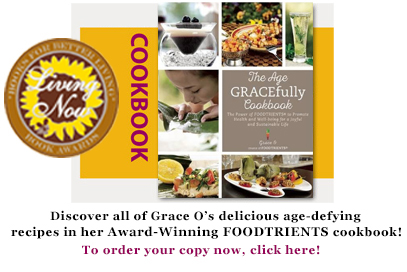What Makes Turkey Terrific?


Turkey gets a great deal of attention around the holidays as standard fare in many homes and restaurants. What better time to talk about all the health benefits of eating this nutrient-rich food! I’ve long advocated that we can get wonderful nutrients from our food if we focus on fresh ingredients. Fresh turkey meat tastes great when roasted and it provides our bodies with much-needed lysine, selenium, and vitamin B12.
Lysine is an essential amino acid that our bodies use to build muscle, absorb calcium, and produce hormones, enzymes, and antibodies. Because our bodies can’t manufacture it, we can only get it from dietary sources of protein like poultry, red meat, fish (especially sardines), eggs, cheese, and beans. A derivative of lysine, allysine, is used to produce elastin and collagen, which help keep our skin strong and young-looking.
Selenium is a trace mineral with anti-inflammatory, immunity-boosting, and disease-preventing properties. It’s one of the 26 compounds I identify in my cookbook, FoodTrients: Age-defying Recipes for a Sustainable Body, as a FoodTrient—a powerful nutrient our bodies need to maintain optimum function. Selenium is found in Brazil nuts, mushrooms, poultry, red meat, eggs, and seafood. Our bodies put selenium together with proteins to make antioxidant enzymes. Besides fighting the signs of aging, these enzymes help regulate thyroid function and boost the immune system. Some medical studies have shown positive links between selenium consumption and reduced cancer risk.
Vitamin B12 is used by every cell in our body to make energy. If you have too little B12, you may experience depression, central nervous system problems, and anemia. B12 is so key to healthy brain function that many food producers are fortifying their products with it—such as breakfast cereals and energy bars. Poultry, beef, and dairy products are natural sources of B12. As Dr. Mark A. Rosenberg writes in his blog post on this FoodTrients website, “B12 is also crucial to cognition, memory, and mood.” (Read about the American Journal of Clinical Nutrition study of vitamins B6 and B12 and how they lower the risk of developing depression here on the FoodTrients website.)
Turkey is naturally lean, and is more healthful when eaten without its skin. To get even more health benefits, I buy free-range and hormone-free poultry, which provides higher nutritional value than poultry that has been given antibiotics or farmed. Roasting an entire turkey can be a daunting task, so I often work with only the turkey breast or turkey cutlets. In my cookbook FoodTrients: Age-defying Recipes for a Sustainable Body, I share my recipe for Stuffed Turkey Rolls. I take skinless turkey cutlets and roll them up around my homemade Savory Stuffing. I first soak the turkey in a red-wine and Worcestershire marinade so that when the turkey rolls cook, they create their own delicious sauce. It’s a dish that’s fancy enough to put on a holiday table for two.
